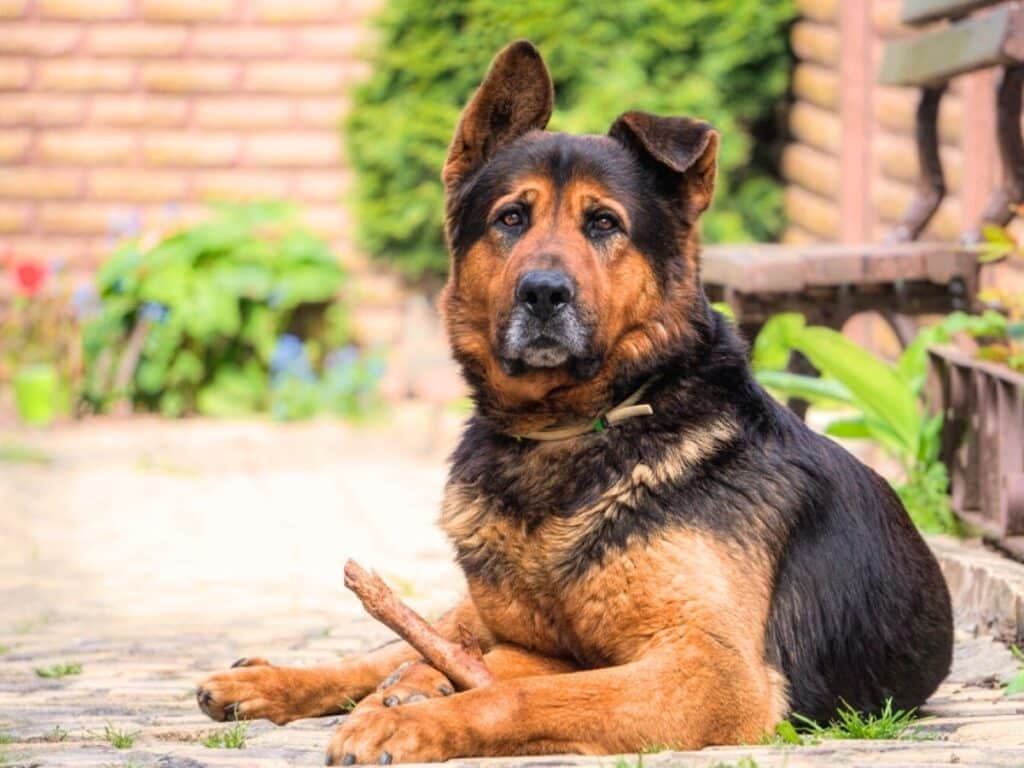So you have made the decision of buying a German Shepherd puppy? Well, Congratulations!
In this blog, we will guide you through the essential steps to ensure that you make an informed and responsible choice when welcoming a German Shepherd puppy into your home.
Whether you’re a first-time dog owner or a seasoned pet parent, these tips and insights will also help you navigate the process of finding a reputable breeder.
Buying a German Shepherd Puppy
Before buying a German Shepherd puppy here are 6 questions to ask yourself:
- Do you want a male or a female dog?
- Do you want to buy a Working Line GSD or a Show line? (Family companion or a working dog)
- Have you considered the cost of buying and maintaining a GSD? (Initial + ongoing costs)
- What’s your preferred GSD coat length and color?
- How to find the best source of GSD puppies according to your budget. (Shelters, breeders, etc.)
- How to find a reputable German Shepherd breeder?
In the following sections of this article, we will delve into each of these points in-depth and provide valuable guidance to help you choose a reputable source for buying a German Shepherd puppy.
1. Male GSD or a Female GSD

Both male and female German Shepherds can make wonderful companions, but they may have some differences in temperament, behavior, and physical characteristics. Here are some considerations to help you make an informed decision:
1. Temperament
Male GSDs may be slightly more assertive and dominant, while females tend to be more nurturing and attentive. If you’re looking for a more affectionate and caring companion, a female might be a good choice.
2. Size and Strength
Male German Shepherds are typically larger and heavier than females. If you have physical limitations or prefer a more manageable size dog, a female might be a better option.
3. Training and Obedience
Both male and female German Shepherds are highly trainable and eager to please. However, males may be slightly more focused on their handlers during training, while females might display a bit more independence.
4. Socialization
Male German Shepherds may exhibit more territorial behavior and dominance tendencies towards other male dogs. Females can also be territorial, especially if they’re not spayed, but they tend to be more accepting of other dogs in general.
5. Heat Cycles and Neutering
Female German Shepherds experience heat cycles twice a year, which can last for several weeks. During this time, they may exhibit behavioral changes and attract male dogs.
If you don’t plan to breed your female, spaying her can prevent unwanted litters and eliminate the inconvenience of heat cycles. Neutering male German Shepherds can help reduce territorial and aggressive behavior.
RELATED: How Long Does German Shepherd Heat Cycle Last?
6. Health Considerations
In general, there are no significant health differences between male and female German Shepherds. However, spaying or neutering can have an impact on certain health issues like certain cancers and hormonal imbalances.
Ultimately, the choice between a male or female German Shepherd should be based on your specific lifestyle, preferences, and the individual characteristics of the dog you are considering.
If you want to learn everything about owning a German Shepherd, you can check out this article.
RELATED: Male vs Female German Shepherd: Which is Better?
2. Do you need a family companion or a working dog?
When buying a German Shepherd puppy, it’s best to consider the specific role you want the dog to play in your life.
If you desire a loyal family companion and are not interested in sports or specialized work, a show line is likely the better option.
If you want a dog for advanced training, protection, or specific tasks, a working line German Shepherd may be the way to go.
1. Show Line German Shepherd

- Appearance: Show line German Shepherds are bred primarily for their appearance. They tend to have a more refined and elegant appearance with a sloped back and a straighter hind leg. Their coat may be longer and more luxurious.
- Temperament: Show line German Shepherds are generally calmer and more laid-back compared to their working line counterparts. They are well-suited for families and make excellent companions.
- Trainability: Show line German Shepherds are highly trainable and intelligent. Their calm nature makes them responsive to obedience training and socialization.
- Health: Reputable breeders of show-line German Shepherds prioritize health and genetic testing to ensure healthy litters.
RELATED: Common German Shepherd Health Issues
2. Working Line German Shepherd

- Functionality: Working line German Shepherds are bred for their working abilities, such as herding, protection, police work, search and rescue, and other specialized tasks.
- Temperament: Working-line German Shepherds are typically more intense, and energetic, and have a higher prey drive. They require plenty of physical and mental stimulation.
- Trainability: Working line German Shepherds are also highly trainable but may require a more experienced and consistent approach during training.
- Health: While responsible breeders still prioritize health, certain genetic conditions related to the demands of their work might be more prevalent.
I have also written another article about the distinctions between Working Line and Show Line GSDs that provides a comprehensive exploration of these two distinct types within the breed.
RELATED: 5 Types of German Shepherds
3. Consider the price of a GSD puppy

When buying a German Shepherd puppy, the cost can vary depending on the source and location. However, it’s important to note that prices can change over time and may differ based on factors such as demand, location, and breeder reputation. Here’s a general idea of what you might expect:
1. Reputable Breeder
German Shepherd puppies from reputable breeders often come with health guarantees, proper socialization, and good breeding practices. The cost can range anywhere from $500 to $3,000 or even more, depending on the lineage, bloodline, and breeder’s reputation.
2. Breed Rescue
Adopting a German Shepherd from a breed-specific rescue organization can be more affordable than purchasing from a breeder. Adoption fees typically range from $150 to $500, depending on the rescue’s policies, the dog’s age, and its health condition.
3. Municipal Shelter
Adopting from a municipal animal shelter is usually the most cost-effective option. Adoption fees are generally lower, often ranging from $50 to $200. The fee covers vaccinations, spaying/neutering, and sometimes microchipping.
RELATED: Rescuing and Adopting a German Shepherd: A Step-by-Step Guide
4. Privately Operated Shelter
Privately operated shelters or non-profit animal rescues may have varying adoption fees. It could be similar to municipal shelters, around $100 to $300, or slightly higher depending on the organization and the care they provide to the animals.
Keep in mind that these prices are approximate.
RELATED: The Reality Of Adopting A German Shepherd
Annual cost of maintaining a GSD
Overall, the annual cost to maintain a German Shepherd can range from $1,800 to $4,500 or more, depending on various factors. Here are some common expenses to consider when buying a German Shepherd puppy:
- Food: $500 to $1,000 per year.
- Veterinary Care: $500 to $1,000 per year.
- Grooming: $200 to $400 annually.
- Training: $200 to $500 per year.
- Toys and Supplies: $100 to $300 annually.
- Pet Insurance: $300 to $600 per year.
- Boarding or Pet Sitting: $200 to $500 per year.
Before you buy a GSD pup, it’s crucial to understand the full picture of what it takes to care for this magnificent breed.
Check out my article about Financial Considerations for German Shepherd Owners, if you need more information about the initial expenses to ongoing costs of owning and maintaining a GSD.
4. What’s your preferred GSD coat length and color?
German Shepherds are known for their beautiful coats, which can come in various lengths and colors.
1. Different coat lengths available in German Shepherds
German Shepherds can have either short-haired or long-haired coats. Both types have their own unique characteristics and benefits. Let’s take a closer look at each:
Short-Haired Coats

German Shepherds with short hair have a sleek and low-maintenance coat. Their fur is dense and lies close to the body, providing them with excellent protection against weather conditions. This type of coat requires less grooming compared to long-haired German Shepherds.
Long-Haired Coats

If you prefer a more luxurious-looking dog, then a long-haired German Shepherd might be the right choice for you. These dogs have an elegant appearance with longer fur around their ears, tail, and legs. However, it’s important to note that long-haired coats require regular brushing to prevent matting and tangling.
If you lead an active life or live in a warmer climate, a short-haired coat may be more suitable for your needs. On the other hand, if you enjoy spending time grooming your dog and don’t mind the extra maintenance, a long-haired German Shepherd can be a stunning addition to your family.
2. Exploring various GSD color patterns
German Shepherds come in different color patterns that add to their beauty and uniqueness. Here are some common German Shepherd color variations:
- Black and Tan
- Sable
- Bi-color
- Solid Black
- Black and Red
- Black and Silver
- Liver
- Blue
While coat length and color are important aspects of your dog’s appearance, they shouldn’t be the sole determining factors. Ensure that you choose a reputable breeder who prioritizes the health and well-being of their puppies.
4. Choose the best source of GSD puppies.
The best sources of German Shepherd puppies can vary depending on individual preferences and circumstances. However, there are a few common sources that are generally considered reliable and reputable.
1. Reputable Breeders
One of the most reliable sources for German Shepherd puppies is a reputable breeder. These breeders focus on producing healthy, well-socialized puppies with good temperaments.
They carefully select breeding pairs and conduct health tests to ensure the puppies are free from genetic disorders. Reputable breeders also provide ongoing support and guidance to puppy buyers.
2. Breed Specific Rescue Organizations
Another great source for German Shepherd puppies is breed-specific rescue organizations. These organizations rescue and rehabilitate German Shepherds in need and work to find them loving forever homes.
Adopting from a rescue organization not only gives a deserving dog a second chance, but it can also be a more affordable option compared to purchasing from a breeder.
3. Local Shelters and Animal Control Facilities

Many German Shepherd puppies end up in local shelters and animal control facilities due to various reasons.
According to the PDSA, adopting from these organizations is not only a cost-effective option, but it also saves a life and helps reduce the number of homeless pets.
It’s important to note that the availability of German Shepherd puppies in shelters may vary, so it’s worth checking regularly and being patient.
4. Online platforms
There are websites and platforms dedicated to connecting potential puppy buyers with breeders. Exercise caution and research thoroughly before making any commitments. Look for reviews and feedback about the breeders or sellers you come across.
5. Local pet stores
Some pet stores may have German Shepherd puppies for sale, but be careful when purchasing from them. Ensure that the store follows ethical practices and that the puppies are well cared for.
6. Personal Recommendations
Sometimes, the best source of German Shepherd puppies can come from personal recommendations. If you know someone who has recently had a positive experience with a breeder or has adopted a German Shepherd puppy, they can provide valuable insights and recommendations.
5. How To Find a Reputable German Shepherd Breeder
Finding a reputable German Shepherd breeder can be a crucial step in ensuring you get a healthy and well-bred dog. Here are some tips to help you find a reputable breeder:
1. Research and educate yourself
Start by doing thorough research on German Shepherds and the breed standards. Understand their temperament, health issues, and specific needs. This knowledge will help you identify a reputable breeder who prioritizes the breed’s well-being.
2. Seek recommendations
Reach out to local German Shepherd clubs, veterinarians, and experienced dog owners to ask for recommendations. They can provide valuable insights and direct you to reputable breeders they have had positive experiences with.
3. Visit dog shows and events
Attend dog shows and events where German Shepherds are showcased. This will give you the opportunity to meet breeders, observe their dogs, and ask questions. Reputable breeders often participate in such events to showcase their breeding program and the quality of their dogs.
4. Visit the breeder’s facility
Once you have shortlisted potential breeders, schedule visits to their facilities. A reputable breeder will have a clean and well-maintained environment for their dogs. Observe the living conditions, check for proper healthcare measures, and ensure the dogs are well-socialized and happy.
5. Ask about health testing
Reputable breeders prioritize the health of their dogs and conduct various health tests to ensure their breeding stock is free from genetic diseases. Ask the breeder about the health testing they perform on their dogs and request to see the results. They should be transparent and willing to share this information with you.
6. Meet the parents
Request to meet the sire and dam of the litter. Observe their temperament, structure, and overall health. This will give you an idea of what to expect in terms of the puppies’ characteristics.
7. Ask about guarantees and contracts
Reputable breeders often provide health guarantees and contracts that outline their responsibilities and your rights as
6. What to look for in a reputable GSD breeder?

When searching for a reputable German Shepherd breeder, there are several key factors to consider.
1. Health testing
Reputable breeders prioritize the health of their dogs. They conduct health tests on their breeding dogs to screen for genetic conditions common in German Shepherds, such as hip dysplasia, elbow dysplasia, and certain eye disorders.
They should be willing to share the results of these tests with potential buyers.
2. Breeding practices
Responsible breeders carefully plan their litters, taking into account the compatibility of the parent dogs’ genetics, temperament, and conformation. They breed to improve the breed and not just for profit.
They limit the number of litters each dog has to ensure the health and well-being of their breeding dogs.
3. Socialization and a healthy environment
Puppies raised in a reputable breeding environment are exposed to various stimuli, experiences, and people during their critical socialization period. They are well-socialized and adapt more easily to new situations and environments.
4. Reputation and references
Look for breeders with a positive reputation within the German Shepherd community. Check for online reviews and testimonials from previous buyers. Reputable breeders are often recommended by breed clubs or breed-specific forums.
5. Transparent and honest communication
A reputable breeder will be open and honest about their breeding practices, health testing, and the strengths and weaknesses of their dogs. They will be willing to answer all your questions and provide information about the puppy’s lineage.
6. Contract and health guarantee
A written contract is essential when purchasing a puppy from a reputable breeder. The contract should outline the responsibilities of both the buyer and the breeder and include a health guarantee against hereditary diseases.
7. Visiting the breeder
If possible, visit the breeder’s facility in person. This will allow you to see the conditions in which the dogs are raised, observe the puppy’s interaction with its littermates and parents, and assess the overall cleanliness and care provided.
8. Lifetime support
Reputable breeders are committed to their puppies throughout their lives. They offer ongoing support and are available to answer any questions or concerns you may have about the puppy’s health and well-being.
9. No puppy mills or Pet stores
Avoid purchasing a German Shepherd from a puppy mill or a pet store. These sources often prioritize profit over the welfare of the animals and may not provide proper socialization, care, or health testing.
Remember that buying a German Shepherd puppy from a reputable breeder not only ensures that you are getting a healthy and well-bred dog but also supports ethical breeding practices and promotes the betterment of the breed.
How To Choose the Perfect German Shepherd Puppy

So by now, you have finalized on a breeder/shelter and now you are faced with the task of picking out a puppy from a litter.
Buying a German Shepherd puppy is an exciting and important decision that requires careful consideration. Here are some steps to help you find the ideal furry companion:
1. Evaluate each puppy’s temperament
You want a dog that not only fits your lifestyle but also has a temperament that aligns with your preferences.
To evaluate a puppy’s temperament, spend some time observing them in various situations. Notice how they react to different stimuli and interactions. Look for signs of confidence, curiosity, and sociability.
A well-rounded German Shepherd puppy should exhibit these qualities during playtime or when meeting new people.
Some puppies may be more laid-back and relaxed, while others might be more energetic and playful. Think about what type of dog would be the best fit for your lifestyle and make your decision accordingly.
2. Socialization
Check if the puppies have been properly socialized. A well-socialized puppy will be more adaptable to new experiences and environments.
3. Health
Ensure that the puppies are healthy and have received their initial vaccinations and deworming treatments. Check for any visible signs of illness, such as runny noses, coughing, or lethargy.
4. Physical appearance
While temperament and health are crucial, consider the physical traits you desire in a German Shepherd. Look for a puppy with a well-proportioned body, clear eyes, clean ears, and a shiny coat.
5. Parental assessment
If possible, observe the puppy’s parents or at least one of them. This can give you an idea of the potential size, temperament, and appearance of the puppy as it grows.
6. Energy level
German Shepherds are known for their high energy levels. Assess the energy level of each puppy to ensure it matches your lifestyle and ability to provide proper exercise and mental stimulation.
7. Interaction
Interact with each puppy individually. See how they respond to you and how they interact with toys or other stimuli. A confident puppy with a willingness to engage with you is a good sign.
8. Ask questions
Don’t hesitate to ask the breeder questions about the puppies, their parents, and their breeding practices. A responsible breeder will be open and transparent.
9. Compatibility
Consider your own lifestyle and preferences. Some German Shepherds may be more suited for families with children, while others may be better for individuals or couples.
10. Instinct test
You can also perform a simple instinct test by rolling a ball away from the puppies and observing their reactions. A good German Shepherd puppy will show interest in the ball and may even try to bring it back to you.
Remember, choosing a puppy is a long-term commitment, so take your time to make an informed decision. The perfect puppy is one that fits well with your family, lifestyle, and expectations.
Purchasing a German Shepherd Puppy
Now that you have considered all the factors involved in buying a German Shepherd puppy, it’s time to wrap up your decision-making process. By following these guidelines and understanding the various aspects of bringing a German Shepherd into your home, you can ensure a smooth and successful transition for both you and your new furry friend.
Frequently Asked Questions (FAQs)
1. How much exercise does a German Shepherd puppy need?
German Shepherds are an active breed and require at least 1-2 hours of exercise every day. Regular walks, playtime, and mental stimulation are essential to keep them physically and mentally stimulated.
2. Are German Shepherds good with children?
Yes, German Shepherds can be great family dogs when properly trained and socialized. They are known for their loyalty and protective nature towards their loved ones, including children.
3. Do German Shepherds shed a lot?
Yes, German Shepherds have a dense double coat that sheds moderately throughout the year. Regular grooming sessions, including brushing their coat, can help manage shedding.
4. Are German Shepherds easy to train?
Yes, German Shepherds are highly intelligent and trainable dogs. With consistent positive reinforcement training methods and early socialization, they can excel in obedience training and various activities such as agility or scent work.
5. Can I leave my German Shepherd alone for long periods?
While it’s not recommended to leave any dog alone for extended periods regularly, adult German Shepherds can handle being alone for up to 6-8 hours if adequately exercised before leaving them. However, puppies require more frequent attention and should not be left alone for long durations.




